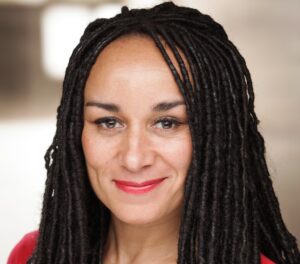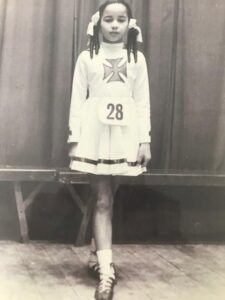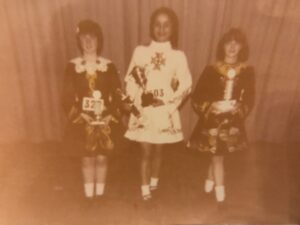
By David Hennessy
Actress, singer, dancer and writer Maria McAteer will open the Shout London festival, the mental health film and arts festival from Ashford Place, when it returns for its second instalment this week.
Maria will perform scenes from her one woman show The Guinness Girl.
The Guinness Girl is a personal story of growing up mixed race and also how Irish dancing was her ‘safe place’ when struggling with a disorder that nobody knew about.
However, it was an ugly incident she had some with some racists that pushed her to finally bring her personal story to the stage. It is currently being adapted for a film but before that hits screens, it will be made into the new one woman show she will provide a taste of next week at Kiln Theatre in Kilburn.
Maria told The Irish World: “I’m excited.
“Starting to feel a bit nervous to be opening the festival but I’m really looking forward to it.
“I’m just going to do a couple of scenes from The Guinness Girl one woman show, which is kind of a spin off from the original play which I did at the Irish Centre in 2019.
“That got the interest from Screen Ireland and started the whole feature film journey, which has been very exciting.
“It’s very much a dream come true for me.
“The story is important for me because obviously it’s semi-autobiographical.
“It’s a story about a child overcoming adversity.
“I just feel it’s an inspiring story for other young people who may be facing all kinds of adversity or problems and how you push through.
“I’m half Irish and half Trinidadian.
“My mum was born in Belfast but she’d probably call herself a Dubliner because she spent most of her life in Dublin.
“I was brought up in Newcastle upon Tyne in the 70s by my mum, and it was quite a tricky time in the 70s because there was a lot of bad feeling towards the Irish after the IRA bombings and also it wasn’t exactly a very accepting time for ethnically diverse people.
“So my mum and I had both lots coming at us, my mum being an Irish woman by yourself with a black child. It was quite difficult.
“And I was quite a hyperactive child, I was climbing the walls so she brought me to the doctor and in the 70s they prescribed phenobarbital for hyperactive children but Mum just said, ‘No, there’s no way. I’m not putting her on that’. Because that’s quite a heavy tranquilliser. I was like four or something.
“So she said, ‘Right, I’m going to drag her along to an Irish dance class and I’m going to get her exhausted and that should do the trick’.
“And thank God she did as well.
“And as soon as I got to a dance class, the music sort of made me want to fly but I was a car crash because I couldn’t keep my arms by my sides.
“I never won a medal for the first few years because I was just flapping my arms around like a bird.
“Mammy and I, the things that we had to kind of put up with on a daily basis.
“The neighbour used to shout horrendous racist and anti-Irish comments over the back wall and we’d just kind of continue eating our Weetabix.
“And we kind of put up with a certain amount of this abuse for a long period of time and it was kind of the norm, so I was kind of used to it.
“But Irish dancing was my escape.
“It was kind of my sane place. It was a place where I could kind of just get away from it all.”

Maria would need her safe place when she started to be affected by depersonalisation-derealization disorder although back then it would not have a name.
“It was when I was about 10.
“It’s now got a name.
“At the time, I didn’t know what it was.
“With the stress of everything, I basically kind of came out of my body.
“When I went to bed at night, I’d float above myself looking down on myself and I was scared to go to sleep at night.
“I was off school for ages because I wouldn’t allow myself to sleep at night because I was afraid because as soon as I lay back on the bed, I would just come out of my body again.
“It used to frighten me.
“So my mum brought me to the doctors and I think he prescribed some kind of sleeping tablets because he sort of felt the most important thing was that I slept but somewhere in my little 10 year old mind, I knew that that was wrong.
“I just used to put on my hard tap shoes and I would just dance, practice and practice harder and harder and harder until I kind of grounded myself and I healed myself through my Irish dancing.
“But also what happened because I was spending hours and hours doing it, I became a really good dancer.
“As soon as I got in, my shoes were on, I was just dancing all the time.
“And then I went on to become the first black world champion dancer and major winner of championships.
“At the time when I was dancing, there were no children of colour dancing at all so I was quite a unique thing at that time,” Maria laughs remembering.

“I remember the first time I qualified for the worlds, walking onto the Mansion House stage in Dublin and the whole of the audience went quiet.
“Everyone was obviously thinking, ‘What is this?’
“But for me as a child I thought, ‘Oh it must be because I’m such a good dancer’.
“So Irish dancing in a way was kind of my sanity.
“I’d been kind of keeping a diary about all of this for a long time and it just kind of sat there.
“I did lots of other plays but The Guiness Girl kind of sat in a kind of cardboard box.
“Because it’s so personal to me, it just sort of sat there.
“And then I had quite a horrible experience the day after the referendum.
“I was just in a cafe with my little girl and the group on the table next to me were sort of raising their glasses to the fact that England was owned by England now and all the foreigners would be going and all of this type of thing.
“And then they started talking about all of the things that they could say and do because political correctness will be out the window, and they started singing that, ‘Eeny, meeny, miny, moe’, song. I’ll not repeat it.
“So I kind of said to them, ‘Oh, could you stop please? Because you’re making me feel uncomfortable’.
“And they were like, ‘Oh, come on. We’re just joking. We’re just having a laugh’.
“But it threw me right back to the 70s.
“I’d never experienced anything like that before.
“I don’t know what happened after the referendum but it almost felt like these people crawled out of the woodwork and felt they were justified in saying all this type of stuff again.
“I was just right back to when I was a child.
“When I got home that day, I was really shaken.
“I put my little one to bed and I looked on Twitter and there was this hashtag ‘Post ref racism’.
“And I thought, ‘Oh, what’s this?
“And I looked and I saw that loads of other people had had similar experiences on that day.
“I sort of felt like, ‘Oh, gosh, I’m not alone’.
“It really frightened me and I felt very isolated for a while in my own town and also afraid that I was going to see this group of people again, but then something kind of clicked in me.
“I picked out The Guinness Girl, and I just thought, ‘You know what? I need to put this on. I need to share this story just to see how far we’ve come.
“That’s why it sort of came out of the box.
“I thought, ‘I don’t want to be frightened anymore. I don’t want to be hiding’.
“It was on at the Irish Centre and it was a great success.
“The Irish community came along, and they were kind of moved by it.”
Maria now hopes to bring the one woman show of The Guinness Girl out next year with the film of the story to follow perhaps the year after.
SHOUT LONDON – The Ashford Place Mental Health Film & Arts Festival is on Tuesday 10th and Wednesday 11th October at The Kiln, Kilburn High Road and The Crown London, Cricklewood.
More information at www.shout.london.


